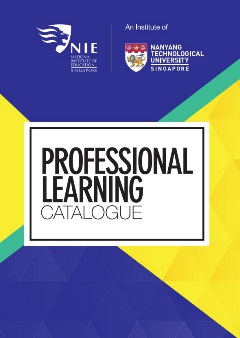Certificate in Educational Support
Overview
- socio-emotional needs of the low progress learners, and
- learning needs of the low progress learners.
a) Diploma in Education (Dip Ed)
b) Bachelor of Arts (Education)
c) Bachelor of Science (Education)
OR
d) Postgraduate Diploma in Education (PGDE) from NIE or its equivalent.
To be considered for admission into the Certificate programme, applicants will need to have at least 2 years of teaching experience in the primary and secondary level.
The Certificate programme will be offered on part-time basis, in the form of a weekly full-day session over 18 weeks. This structure will allow participants to apply what they have learned back in their schools so as to facilitate reflective learning and enrich their weekly conversations.
Classes are conducted through face-to-face and online sessions. In addition to the face-to-face learning, a range of authentic learning opportunities will be incorporated to complement theoretical and research perspectives. These components include peer-to-peer discussions and reflection; learning journeys; and professional dialogues with selected practitioners from schools and MOE. Participants will be encouraged to share their personal and professional experiences of teaching low progress learners, anchored in the theoretical and research perspectives. At the same time, the collective discussion and reflection will help to reinforce the importance of positive professional beliefs about students and student learning for low progress learners.
The Certificate programme is made up of courses that are 1, 2 or 3 Academic Units (AUs), and are equivalent to 13, 26 or 39 hours respectively of study in the form of tutorials, activity-based projects, and or self- directed studies, etc. The certification programme comprises 5 core courses. Participants are required to complete a total of 9 AUs to complete the programme.
| Course Code | Title | No. of AUs |
|---|---|---|
| IEC2021 | Knowing Your Learners | 2 |
| IEC2022 | Planning to Teach Learners in Need of Educational Support | 2 |
| IPS2010 | Assessment to Support Learning in the Classroom | 1 |
| IPS2011 | Enhancing the Teacher-Student Relationship | 3 |
| IPS2012 | Self-Regulation: Key for Successful Learning | 1 |
For its course description, please see below.
| Course | Description |
| IEC2021: Knowing your learners | This course introduces teachers to learner diversities in their current dynamic and developmental context. This is essential to help them in their lesson design to meet the needs of their students with learning and behavioral challenges. Leveraging its impact by linking with the subsequent course on “Planning to Teach Learners in Need of Educational Support”, teachers will use the same case for Learning by design (TbU) within the Triple-T Model D model of Learning, addressing Episteme (“What of learning), Teleos (Why of learning) and Techne (How of learning). Essentially, pragmatism by teachers and usability with meaningfulness of learning by students needs to be addressed. |
| IEC2022: Planning to Teach Learners in Need of Educational Support | This course alerts teachers of the need to use developmentally appropriate approaches and ways to engage students with learning and behavioural challenges with meaningfulness and pragmatism. Leveraging on “Knowing Your Learners”, teachers will use the same case for Learning by Design (TBU) to work backwards based on the learning goals within the Triple-D model of Teaching, addressing Diagnostics, Dialogics and Didactics. Essentially, this is about pragmatism by teachers and translating theories into actual classroom applications. |
| IPS2010: Assessment to Support Learning in the Classroom | This course is aimed at helping teachers develop their skills and strategies in using formative assessment to support students’ learning in low-achieving classrooms. It will emphasize the use of formative assessments as an integral part of the teaching and learning process to promote teaching effectiveness and enhance students’ motivation in learning (e.g. interest, confidence, engagement and achievement). |
| IPS2011: Enhancing the Teacher-Student Relationship | This course seeks to improve teachers’ skills in connecting with and supporting students in the low achieving classroom. It will provide teachers with opportunities to reflect on their beliefs about students’ developmental potentials, help them make a cognitive shift in these beliefs and develop a set of soft skills to support these youngsters as they seek to engage more meaningfully in school. These skills are also instrumental in managing student motivation and engaging them in the classroom. |
| IPS2012: Self-Regulation: Key for Successful Learning | This course seeks to improve teachers’ knowledge about self-regulated learning and skills to help students to be aware, and take actions to meet their learning needs. It provides a description of the essential features of self-regulated learning models widely acknowledged in education. We focus on improving self-efficacy, attributions, strategy use, and effective use of metacognitive knowledge. We conclude with guidelines for integrating self-regulation skills into the secondary classroom. Participants will learn about and engage with most updated research through interactive pedagogies to find out how to make it happen in classrooms. |
Application is through the Academy of Singapore Teachers, based on nomination by the school Principal.
For enquiry on course administration, please e-mail: [email protected].














/enri-thumbnails/careeropportunities1f0caf1c-a12d-479c-be7c-3c04e085c617.tmb-mega-menu.jpg?Culture=en&sfvrsn=d7261e3b_1)

/cradle-thumbnails/research-capabilities1516d0ba63aa44f0b4ee77a8c05263b2.tmb-mega-menu.jpg?Culture=en&sfvrsn=1bc94f8_1)

